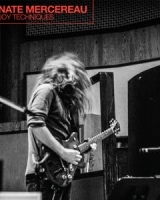Mwenso and the Shakes — Interview with Band Leader and Vocalist, Michael Mwenso
? EMERGENCE
(The Process of Coming into Being)
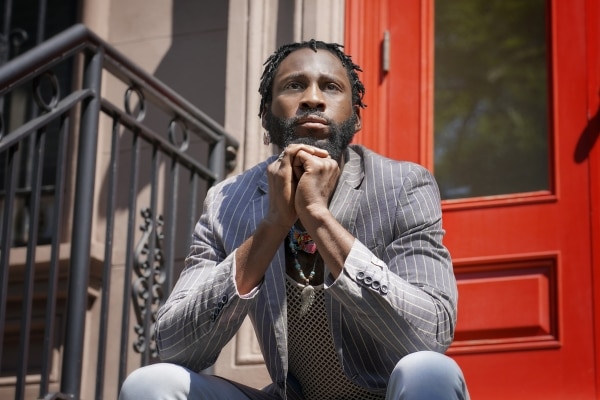
Michael Mwenso | Photo credit: Jennifer Parker
So good looking
Oh, the dog days of summer, you know, those hot August afternoons where the air in NYC has texture—back sweat, front sweat, and everything in-between sweat. The MTA doing its antiquated best to spew riders from GCT to Harlem and even though I know better, I agree to meet on a street somewhere between two avenues at a specific time. For someone who cannot find her way out of a paper bag, who after living in NYC for five years still needs a compass to get from one side of Central Park to the other and I’m telling you, I still wind up roughly where I started; not getting a specific address means I’ll be late even though I’m compulsively on time if only I could stop walking in circles.
Let me get right to the point
Somehow, it works out. On the corner of Lex and 130th is Michael Mwenso and he seems impervious to the nearly 100 degree temperatures. Mwenso is not sweating and he is wearing a blazer, albeit summer weight but a cool AF, striped lavender-grayish, linen blazer over a mesh shirt, and smudge-less mirrored sunglasses. Since the beginning of August, Michael released a new album, performed at Summer Stage in Harlem celebrating the Charlie Parker Jazz Festival, and is heading out on tour.
Born in Sierra Leone, raised from age ten in England, and having lived in the US since his twenties, Mwenso is beholden to no music style, genre or rules except that his music has to be good and good means being open to drawing from all things past. Jazz, blues, standards all have roots in ancestral music. What Mwenso and the Shakes (who are Juilliard trained) do that is different is beyond the cliché of knowing and thus being able to break the rules, it’s more like they’ve internalized years of history and study and bombed the shit out of it.
Take Big Spender, the ninth track on Emergence. I will admit that I held my breath the first time through because no one in my head could possibly mess with Chita Rivera, Suzanne Charney and the other ladies whose deadpan rendition in Sweet Charity is my go to version. Oh, when I’m wrong, I’m oh so wrong. Mwenso, scats, twists, repeats, draws out phrases, changes tempos and is clearly at ease with taking the familiar as if to say, “oh, yeah? how’s about a few laughs? I’m going to show you a good time.” In true Mwenso style, he remains true to the spirit of the original while simultaneously shaking the hell out of it.
Experiencing Mwenso lead his band is a battle between needing to capture each unreal moment and wanting to throw down the electronics and let the entire scene just sear itself into your brain. There is a crazy amount of activity happening on the stage in a Mwenso and the Shakes concert. There are horns, multiple jazz drum kits, African drums, standing bass, bass guitar, piano, alto sax, tenor sax, guest vocalists, interpretive dancers, a rhythm tap dancer, and somehow magically, Mwenso floats above the stage on his own power, driven by the energy of the band, the audience and the history behind the music.
I don’t pop my cork for any man or woman
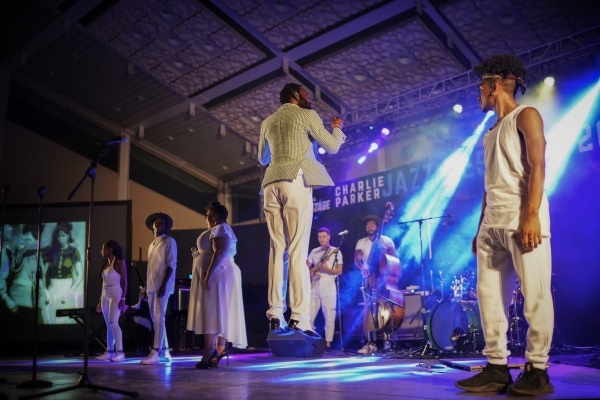
Mwenso and the Shakes Summer Stage 2019 | Photo credit: Jennifer Parker
____________________________
After walking for a bit that hot August day Michael and I chatted about Mwenso and the Shakes, music, and creativity. The conversation has been edited for brevity and clarity.
On the Mwenso and the Shakes sound
As far as the group, Mwenso And The Shakes, we are coming from a love of jazz and music. But definitely a love of music in general. And that’s what allows us to play the way we play music. We just don’t play one style of music. We try and deal with a way of playing through genres and styles. So there’s jazz, but there’s funk, there’s blues, there’s rhythm and blues, there’s gospel, there’s all kinds of different genres.
And then for me that is the way I believe that music, that’s the freedom, that’s the highest level of freedom to be able to play music in a way that allows you to play in a free kind of way—but not stale.
On message
And we have practiced enough to be able to reflect a lot of the styles and the genres of music per se—Black music, American music, folk music, root music. And that’s what we believe and we’re still working on it. I’m still studying. You want to try and reflect the world when you play music.
You want people to not only see the world within what you are presenting to them, but you also want people to see the world. You want them to hear it and see it We’re all immigrants, most of us. So we try and really reflect the world within the construct of what we’re doing.
When music started to make an impression in his life
Well, when music was coming into my spirit, when I was getting into music, that would happen every week. In a sense, it could be one week I fell in love with Ray Charles. Next week it could be BB King.
So, really with me, it was the discovery of music was really the way the spirit of favoritism came in. It would change rapidly. And it would change rapidly through, again, genres and styles which is connected to the way we play in The Shakes. Because every week would be a discovery as a child, whether it was the way Dolly Parton writes song or the way Joni Mitchell sings all the melodies or the way Frank Sinatra deals with time or anything.
On learning about favoritism in music
One thing I was learning was that there could not be any favorite. That you must love the art in a sense that you love every part of it and you discover it as you’re discovering yourself through the music, through the art.
So, ages eleven to like sixteen were very prime years of not only seeing a lot of the great artists live, but definitely discovering the art form in a way that allowed me to chronologically also understand black people and human beings in a certain way. Because when you start looking at music and the history of it, it really is a cross reference on human beings and how they evolve.
On what made people like things at certain times
Why did people like Louis Jordan at this time? Why did people like James Brown? How did people change? How did people’s ears change? Did people’s ears get better as we evolved? Or did it go down? All of that was very interesting to me as a child. Why did people like jazz in this period? Why did people not like jazz in this period? Why did people like rock ‘n roll? Isn’t that the same as the blues?
On retaining a connection with the past
Being an only child, the music became almost like a study. To read about it, to watch videos about it, to ask about it, to pretend you are them. I was doing a lot of that. And in a way you still are. You still are doing those things as you grow. You still trying to be like them. You still trying to figure out who you are. But retaining a connection to them in some way that allows you to still be independent of your own spirit, but also to be connected to them spiritually.
The Shakes, and the language of jazz
The main drawing of how The Shakes came were many nights of hanging out in Harlem, in the apartments and also hanging out in the clubs. All of that added to this particular time, which has now allowed us to be in this time. Jazz music is unique because you’re watching it too in a certain way of how the people communicate. Which adds to you actually being an audience participant,
[It’s not just] all listening. But to watch it, if it is done with the performing art, because you could also watch jazz and the musicians are still as a rock. But if you’re really hearing great jazz music, they are performing it too. The drummer is shaking. The piano player is moving all over the keyboard. The sax, you know, everything is happening. There’s people screaming and hollering. That should be the vibe that’s happening.
If it isn’t, something else is going down. But the best premium of jazz being done is when it’s presented in a way that you’re included into it. And you’re enjoying every part of it. Listening, physically dancing to it, intellectually listening to it and understanding it. And spiritually hearing the secret cues that are in it too. Because music also has all the secret stuff in it too.
Jazz has a lot of different languages, languages not in a sense of when we talk about notes and stuff, but spiritual language, things that you can only hear when you’re listening to it in a certain way. But that is all music too. Jazz has a special pattern but so does the blues.
I was saying to someone the other day, as a jazz musician, the trick is to be informed by all of the other music that is connected to it. Gospel music, rhythm and blues, everything like that. Because then that gives you a deeper understanding of the tree.
Faith, uncertainty and jazz
Well, it makes it harder sometimes when you’re dealing with the other side of things in a sense—the days when you’re not feeling as strong as you want. Because really to be any type of artist, as you know, it’s really the strength you need and the persistence and the belief and the faith and the trust. It’s more that you have to figure out how to develop a spiritual belief system that allows you to get through the hard days. Which will be fifty-fifty. One day you could be being adored by people. The next day you can be in court getting kicked out your house. You never know.
That’s a real story, you never know what’s going to happen. This is where the jazz thing comes and helps. Because this is really the values of jazz, which is very different than any other musical art form. Which I’d say is that, you want to know about improvisation, you have to improvise quick with what life is giving you. You can’t stay on stuff. You have to keep it moving. It’s more about your spiritual self. If your spiritual center is not good, you won’t get far. You have to have a spiritual center that even when something happens, which is a “no,” you can still see “yes,” you can still see the light.
So for me, I think developing even more of my spirituality has helped. Prayer, meditation, to say things.
So you have to say it, and you have to believe it, and it will be hard. It will be hard. Sometimes you won’t believe in yourself. Sometimes you’ll be dealing with the spirit of depression so deep, that you won’t even want get out of your bed. But if you make your life about people, it’s easy. That’s what’s helped having The Shakes.
If it was just Michael Mwenso that I had to think about, it’d be easier to give up. But when you have ten, eleven, twelve people that believe in you, you can’t, you have to be like, okay, even if I don’t believe in myself these people do, so I got to keep it moving.
the big D
So that has added to me dealing with depression, because depression is real. It’s the most, it’s the unseen, it’s the deepest of the unseen spiritual energies that we have still not figured out. Because we have only started to be public about it in the sense of human beings and how we deal with this. I call it the big D, spirit of depression. It’s real. It comes in, it comes out.
And it’s not to overcome it … It’s to more confront it. Be real about it. When it’s happening. [Acknowledge] I’m in it today and be real about it. Because [if you let] depression hit you, it will just come and then you’re done.
It’s all connected
So, this is connected to what we were saying, being an artist, being a human being, it’s all connected. It’s about your center. Your center has to be strong. Then nothing can mess you up.
Let me show you a good good good time, a good, good , f*@king assed time
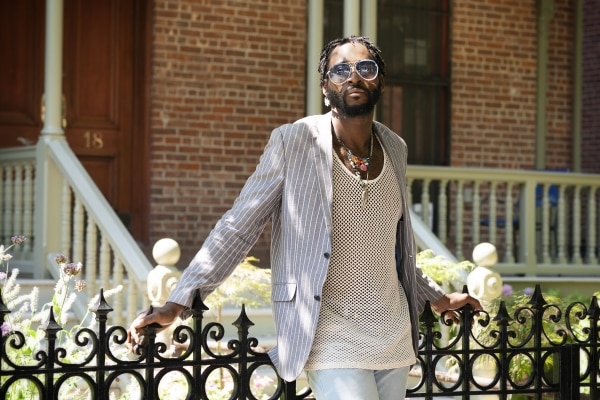
Michael Mwenso | Photo credit Jennifer Parker
EMERGENCE TRACKLIST
1. Overture
2. Resolute
3. Sweet Thing
4. Know the God In You
5. Echoes of Spring
6. Strength Will Keep You Here (Interlude)
7. Brilliant Corners
8. You Can Do No Wrong
9. Big Spender
10. I Loves You, Porgy
11. No Regrets
12. No One As Special As You (Coda)
MWENSO & THE SHAKES LIVE
September 21 /// White Plains, NY /// White Plains Jazz Festival
September 28 /// Auburn, MA /// Arcadia Folk Festival
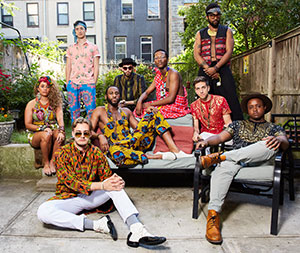
Mwenso and the Shakes Photo Credit Elizabeth Leitzell
MWENSO & THE SHAKES “HARLEM 100”
